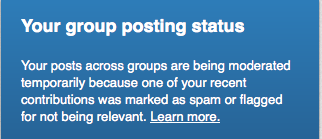About a week ago this little blue message appeared in the sidebar in one of my LinkedIn groups.
I won’t write the exact words that spewed from my lips – that might cause this post to get flagged too, but you get the gist. I checked my other LinkedIn groups. The same horrifying little blue sidebar mention appeared again and again. My trusty egg timer signaled the end of my twenty-minute LinkedIn allotment for the morning but it didn’t matter. I was now operating in triage mode. Since I know what spam looks like – even though right this minute the Canadians are in the process of redefining it – and I preach relevancy online and offline – I was off to get to the bottom of this.
I clicked the link to “learn more” and read through an article on Moderation of Your Posts in Multiple Groups. It offered some nice and little known information about the inner workings of LinkedIn Groups, but nothing specific. I wanted details. I wanted to know what post had put me on group probation and where it occurred. If nothing else I saw this as a teachable moment that would serve not only me but everyone I work with.
I sent a note to LinkedIn customer service and tried to practice patience.
However, patience is not my strongest virtue so I decided to make best use of my wait time by trying to figure this out myself. I scrolled through all my recent posts and tried to determine which might be construed as “not relevant” or “spam.”
Was it the article on How You Fascinate in which I share Sally Hogshead’s brilliant Fascination Advantage Assessment?
Was it the one on How Social Networks Like Twitter Can Influence?
Or was it the one on The Upside Of The Stress Of Living In A Digital World? Yes, that was about my trip to Cabo but it had relevance to life in the digital age.
Had I posted in too many groups at once?
But if that sets it off, why would the Sharing Bookmarklet on LinkedIn allow multiple postings to begin with? Google+ prevents sharing in more than one community at a time.
Was it my references in my blogs to my Your Digital You Workshops?
But then who doesn’t create content without at least an implied “ask”?
I admit it. I was traumatized. I felt censored. It was as if suddenly this brave new digital world that I evangelize had put a great big old gag in my mouth. Yes – I could still post – but not without a secret review board.
Something felt so very wrong.
LinkedIn was pretty, and I will add impressively, quick to respond. Even if their answer didn’t suffice. More links to more articles that were supposed to offer insight as to what it might be and best practices for postings – but nothing specific to me. I wanted specifics.
So I pushed.
It was suggested that I contact all of my Groups managers. A lovely suggestion if I was in a handful of groups. But at last count I was in 26 and had no intention of writing to every manager – nor did I think I should have to.
Yes – I was getting edgy.
I asked to be referred up the ladder.
While I waited for that reply my imagination ran wild.
Was there someone out there in one of my groups who had done this on purpose?
Who was out to get me and what I do?
Had someone dismissed me the way I do an annoying ad in my Facebook feed?
What could I have possibly posted that was so misconstrued?
The Internet was supposed to be a place to freely exchange information and opinion?
What was going on?
A day of this obsessive brainstorming passed before I got an answer. LinkedIn gave me the name of the culprit group as well as the suggestion I reach out to them for details or “seek membership in a more receptive group.”
I won’t name names but I will say it took me quite by surprise.
I reached out. The person I corresponded with apologized but shirked responsibility. They said that the flag came from members of the group and was not something the administrator or manager had done.
Which is not entirely true. I’ve since learned Group Managers can choose to allow or not allow member flagging and even set a number of flags barometer. And when that’s triggered, it still shows up in their cue as to what has been flagged – so the group manager knows. Whether they choose to intervene is on them.
They did not specify what post or posts set this whole thing off. My guess is that while they are actively using it for their own self-promotion – which is why most groups are formed – I get it – they really don’t have anyone moderating contributions other than their own.
Which left me, the self-proclaimed digital evangelist who promotes the sharing of relevant, useful and sometimes entertaining content both disconcerted and reflective.
It put me on pause. Since I still didn’t know what set the whole trauma off I found myself a bit fearful of writing something that would trigger it again. I felt stifled and uncertain.
And then I came to my senses.
I don’t spread spam. I share good content. That doesn’t mean everyone will like it or even interpret it the way I intended. I can’t trouble shoot everything. I can employ best practices. But as long as I continue to share my blog I assume risks. Like being flagged in a group whose members might not think like I do.
In which case, LinkedIn offered very good advice. Seek more receptive groups.




Leave a Reply